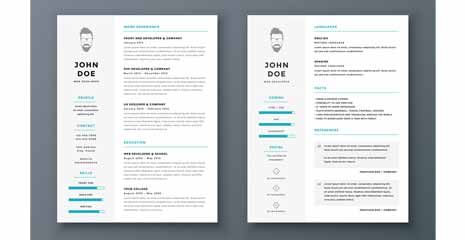How to Write a Resume for a Job?
Resumes are often the first step of finding a job. You can read more about resumes in our blog post on the subject. However, they are not enough to get you hired! Resumes are usually full of words and phrases that make you sound like you know what you’re talking about. However, this is rarely how employers perceive candidates with similar experiences.
What Should You Include In Your Resume?
As a general guideline, the following sections should be a part of your resume for ibps recruitment:
1. Name
Your name should always be included on your resume. If it’s not, make sure you are properly credited for sub-contract work or business ideas.
2. Work History

List the most recent 3-5 jobs of which you have had more than 1 role each (i.e., include all roles even if they differ substantially). Add a section dedicated to internships, training and volunteering, but use big font so that it stands out against a boring list of jobs. We’ll talk about this in more detail later on.
3. Education
Organizations are not going to care about your MBA, although it’s still a great thing to mention if appropriate. List school names and majors only where you have been doing regular studies for at least 3 years, enough time that tasks were meaningful or challenging (which mean we may be talking 2-5 types of education). You should however include other types of education like special courses.
4. Skills

These are the actual things you did at your job or volunteer activities, which make you an expert in them and put some value on what they do to the public. Put yourself out there! Here is where most companies see your experience as worthless, but it does up to you how confident (and careless) will be showing that inexperience through words/phrasing/descriptive stories.
5. Honors and Awards
These are the top skills you have as a professional, but they can also show your character or professionalism in some specific activities outside of work. This is where most people go wrong: making awards sound cheap instead of being appreciated for standing out from other candidates, showing off by saying things like “awards I received” or pretending that trying to impress anyone with honors is a dirty trick.
6. Certification
Not admitting that you didn’t finish high school is a terrible idea because there’s no way of convincing your new company to pay for it later on and the only thing they’ll think about this issue is. You probably don’t have any choice but to mention if relevant (i.e., stating the reason for not having it), so do so carefully and show your willingness to change it.
7. Portfolio

How nice it is to see a portfolio with incredible examples of how you’re committed to work? The trick here is that these are usually two separate things. Your portfolio should be your entire life performance shown without making references only using the skills selected by the hiring manager for this place or company. If collecting pieces together works well enough but needs more time and care, you can pick a few examples from non-continuing jobs as well. Simply put, one big portfolio with several smaller ones is too much work and not worth the time/money spent on it.
Conclusion
In the modern world, there are many different types of jobs. To find a job that suits you, you need to create a resume. Resumes have been around for a long time and there are many things that can be done with them.

